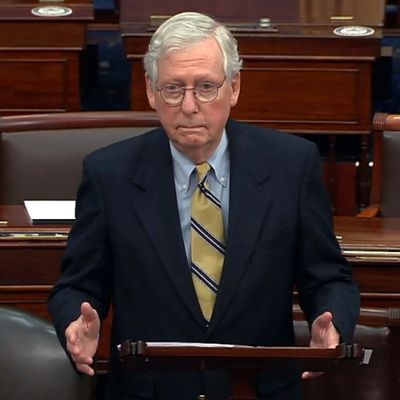
Earlier this month, the Republican National Committee passed a resolution censuring Representatives Liz Cheney and Adam Kinzinger for participating in the congressional committee investigating the January 6, 2021 Capitol riot. The resolution controversially declared the probe “a Democrat-led persecution of ordinary citizens engaged in legitimate political discourse.”
This is the clearest example to date of Republican efforts to whitewash the insurrection and its inciter, Donald Trump. But just one year ago, it wasn’t clear the party would be so forgiving or forgetful. Even as they voted on February 13, 2021 to acquit Trump on charges that he incited the insurrection (his second acquittal after a second impeachment), Republican senators weren’t that sunny about the violent protests they had just experienced. In fact, many went out of their way to criticize Trump’s conduct.
Seven Republican senators (Richard Burr, Bill Cassidy, Susan Collins, Mitt Romney, Lisa Murkowski, Ben Sasse, and Pat Toomey) voted to convict the 45th president of “high crimes and misdemeanors.” But the 43 Republicans who voted to acquit him weren’t necessarily defending any of the misbehavior, Trump’s or the mob’s, on January 6. Most made the constitutional argument that impeaching and convicting a president who was no longer in office was an abuse of the congressional impeachment power, regardless of what Trump did.
Some, notably Mitch McConnell, went out of their way to suggest Trump would have been convicted of the underlying charges, had they been brought in a constitutional manner.
Minutes after voting to acquit the former president, McConnell delivered a speech on the Senate floor, in which he clearly blamed Trump for the events of January 6:
Fellow Americans beat and bloodied our own police. They stormed the Senate floor. They tried to hunt down the Speaker of the House. They built a gallows and chanted about murdering the vice president.
They did this because they had been fed wild falsehoods by the most powerful man on Earth – because he was angry he’d lost an election.
Former President Trump’s actions preceding the riot were a disgraceful dereliction of duty.
… There is no question that President Trump is practically and morally responsible for provoking the events of that day.
The Republican leader went on to lambast Trump for creating a poisoned atmosphere in the lead up to January 6 with his “increasingly wild myths” about a stolen election, and for continuing to press “his scheme to overturn the election” even as the violence unfolded in the Capitol. But, McConnell said, the question of impeachment was “moot,” as Trump was already out of office:
If President Trump were still in office, I would have carefully considered whether the House managers proved their specific charge.
By the strict criminal standard, the president’s speech probably was not incitement.
However, in the context of impeachment, the Senate might have decided this was acceptable shorthand for the reckless actions that preceded the riot.
But in this case, that question is moot. Because former President Trump is constitutionally not eligible for conviction.
No wonder Trump still loathes McConnell. But the man he keeps trying to label “Broken Old Crow” wasn’t flying alone. According to an analysis at the time from Just Security, of the 43 Republican senators who voted to acquit Trump, 13 were critical of his conduct, and another 19 offered no defense of it. Some of the critics were pretty scathing. Senator Shelly Moore Capito said “the actions and reactions of President Trump were disgraceful, and history will judge him harshly.” Senator Rob Portman called Trump’s words to the mob before the riot “inexcusable,” and Senator Dan Sullivan “condemn[ed] former President Trump’s poor judgment in calling a rally on that day, and his actions and inactions when it turned into a riot.”
While some Republican senators did defend Trump against charges of incitement of insurrection, typically deploying a strict definition of the term “incitement” from criminal law, no one defended the rioters themselves, though some sought to distinguish between those who invaded the Capitol and those to whom Trump had spoken immediately before the invasion. Senator Ron Johnson later argued that the rioters weren’t carrying weapons sufficiently to justify the label of an “armed insurrection.” Senator Josh Hawley famously raised a clenched fist in apparent solidarity with the mob as he entered the Capitol. And many Republicans in and beyond Congress, before and after the trial, claimed that at least some of the more violent rioters were agents provocateurs representing antifa or some other allegedly left-wing group of conspirators. House members Mo Brooks (who spoke at Trump’s rally), Matt Gaetz, and Paul Gosar all articulated that unsupported idea.
What nobody in Congress did was defend the rioters as “patriots” or characterize their conduct as “legitimate political discourse” (though one House extremist, Andrew Clyde, did characterize their conduct at one point as similar to a “normal tourist visit”).
Some (e.g., House Republican leader Kevin McCarthy) have tried to rationalize the RNC’s “legitimate political discourse” language as referring to the House Select Committee subpoenaing people who weren’t actually in Washington on January 6. But that’s certainly not what a plain reading of the resolution suggests.
McConnell, McCarthy’s Senate counterpart, has been as culpable as anyone else in his party in sabotaging congressional investigations of what happened on January 6. But at least McConnell hasn’t entirely forgotten his immediate impressions of what happened that day and who was responsible. In his weekly press conference after the RNC resolution passed, the Kentuckian was blunt:
We all were here. We saw what happened. It was a violent insurrection for the purpose of trying to prevent the peaceful transfer of power after a legitimately certified election, from one administration to the next. That’s what it was.
It’s discouraging that a year after Trump’s acquittal, that sounds like a shockingly provocative statement. But now it’s clear the Republican Party is Trump’s more than McConnell’s.






























